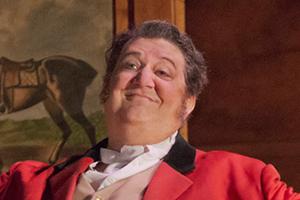Student Life
Feature Fridays
Falstaff, by Giuseppe Verdi

Welcome to Feature Fridays! Each week, AU Music Library staff highlight an item from our collection. While the library is closed, we will feature items that are available for streaming. This week student assistant Cameron Betchey reviews Falstaff, by Giuseppe Verdi, as performed by the Metropolitan Opera and available through the Metropolitan Opera On Demand streaming platform.
Opera often falls on one end of the spectrum or the other, either the heartbreakingly tragic or the lighthearted comedy. One of the most famous comedies is the story of Falstaff, a lethargic and womanizing knight with an inflated ego (who first appears in Shakespeare's works). He often abuses his power in society as a man and puts women into compromising situations. However, like all good art Giuseppe Verdi uses his opera as a commentary on this issue with society. He addresses these acts of oppression through comedy and a plot that resembles other operas like The Marriage of Figaro or Cosi fan tutte, intricate and comical.
There are two video performances of Falstaff available through Metropolitan Opera On Demand, one from 2013 and one from 1992. There are also audio recordings reaching back to the 1960s (2019, 2002, 1996, 1986, 1975, and 1967). This would be an excellent resource to do a study on how opera performances have changed at the Met from a musical or technical perspective. It is fascinating to see how different singers portray the same character, and what they achieve through their performance.
“Sul fille d’un soffio etesio'' is one of the most beautiful arias written for sopranos. It is a delicate and complicated display of musical mastery. The instrumental and vocal parts contradict throughout the entire piece, creating a difficult task for any singer. The vocalist floats far above the piano part, displaying a high degree of technical skill while also creating the illusion that it is incredibly easy for them. The aria has an ethereal and angelic quality because of its extremely high range, emulating the story of the fairy queen that it is written about. It is also a point in the opera when disbelief is suspended and the mystical quality of live performance is at its peak.
I would recommend this opera to people who are looking for a way to begin watching opera, without diving into a really heavy and sad plot. Falstaff is light and easy to follow, it keeps viewers engaged for both its stunning music and its comedy, which remains relevant even today. It is also a fascinating social experiment and makes very relevant commentary on how women should be treated in society and the role toxic masculinity plays in their oppression. Metropolitan Opera On Demand is an excellent resource for people who want to begin watching opera and for people who have a love for it already.

